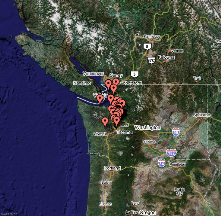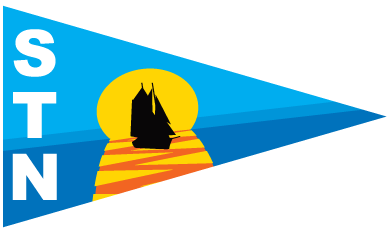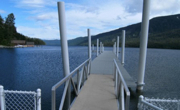Culture Change Letter #165 - In the waters around Seattle, Washington, three dozen communities are enriching their bioregion with a common vision of sustainability -- despite the pressures of corporate globalization dominating almost everyone's life. This new vision is being coupled with the resurgence of sailing, with an eye to the tempestuous horizon promising the unprecedented effects of peak oil and global heating.
The roots of this developing project include local, native traditions as well as some modern daydreaming sailors hailing from as far away as California.
With faith in both humanity and renewable-energy powered sails, an historic movement is getting off the ground in the Puget Sound. The group called Sustainable Ballard had already advanced green initiatives in their Ballard neighborhood northwest of downtown Seattle, gaining the attention of Al Gore. After much success in its four years of organizing, the group has an offspring that seems destined to become far bigger than the parent: SCALLOPS - Sustainable Communities All Over Puget Sound.
Before going further into SCALLOPS and Sail Transport Network, let us capture the essence of Sustainable Ballard. It was born out of frustration with anti-war activity when the U.S. and Britain invaded Iraq. During this time, the founders were also aware of peak oil and climate change. Seeing the futility of attacking a negative (the executive branch across the continent) without offering an alternative, Sustainable Ballard's founders -- Vic Opperman, David Wright, and Erica Jones -- decided to focus their energy on rallying people around positive solutions to our oil-dependent, global-heating lifestyle.
As an example of the projects spawned by Sustainable Ballard, the whole town of Seattle has been turned on to local food supply issues. On Aug. 4, 2007 a local daily paper paid front-page attention to Sustainable Ballard's "100 Mile Diet." As people take the challenge, they get to know their local food sources while increasing awareness of the dangerous syndrome of "blueberries in winter" that Matt Simmons, petroleum-industry investment banker, has decried.
How Sustainable Ballard succeeds
The first festival put on by Sustainable Ballard was in 2003, and the three founders did all the work. Solid organizing and growth of the organization pulled in more and more activists and volunteers, such that subsequent Festivals grew by leaps and bounds. Looking at the pieces necessary in the creation of an autonomous community that can survive if energy and food from far away are cut off, a structure like a starfish took shape. There are at present seven "arms" of the starfish:
- Transportation Guild (includes the "Undriving" campaign to maximize buses, and the biodiesel project)
- Urban Design
- Food, Health and Medicine
- Home energy
- Community (includes Buy Local and homeless)
- Water, waste, environment
- Arts, crafts
At the hub there's administration -- all volunteer. Likewise for the "IT guy," PR, Finance, and Board of Directors. Vic Opperman has been the founding president, and recently turned over the reins to Jenny Heins.
Although Seattle has over a million people in and around it, Sustainable Ballard's approach is to be a global example of an urban environment within a large city. Ballard is "carbon neutral" thanks to a "climate trust fund" and a program for individuals called "achieve net green" costing $17 per month. The carbon footprint of Ballard is further reduced by wind generation and tree planting (elsewhere, providing offsets).
Because the group is all-inclusive, it is non-polarizing, and the city of Seattle feels comfortable consulting them. Fortunately, the city's mayor is keen on organizing hundreds of other cities with the Mayor's Climate Protection agreement.
Sustainable Ballard offers a library for tool sharing for gardening, as well as land sharing: some people don't have time to garden on their own land, and they offer space for those who have the time but not the land. The same principle works for all the guilds (starfish arms), as people exchange skills and their time to achieve goals. Bartering is considered vital for community health, and serves to deprive the global corporate economy of fuel for burning the planet.
Such projects of sustainability greatly interest the Culture Change reader, but the most ambitious of them all seems to be the one resulting from Sustainable Ballard's reaching out to fellow groups around the Puget Sound. SCALLOPS links groups such as Sustainable Ballard, Green Everett, Sustainable Bellingham, and about three dozen more at the latest count. More groups are joining and attending meetings.
SCALLOPS could help transform the local economy when the vast vacuum created by the loss of cheap energy and imported food greets society one day possibly soon. And many of these activists see sailing and kayaking/canoeing as vital elements for our near and long-term future.
Where I write from in the San Francisco Bay area, yachting is popular and there are interesting destinations in a protected area. This makes commute-by-sail a natural for its strong return in anticipation of energy collapse. However, the community has not been so receptive to Sail Transport Network as Puget Sound has been, and Sustainable Ballard may be the reason for Seattle's edge on leading with such a model for sustainable travel and trade.
The difference may be in philosophy or world-view: "This is about survival for the human species", sad Ann Sheerer at Sustainable Ballard's presentation at the Climate Convergence in Skamokawa, Washington, on August 9. While a few people in San Francisco Bay area understand this, most groups at all comparable to Sustainable Ballard have rather an "environmental issues" approach, with the assumption that seven million people in the Bay area will somehow be transformed toward a green survival. Yet, as a trend setter, San Francisco Bay could regain its traditional maritime pride by hoisting sails with a new purpose. Some inspiration from Ballard:
“We have got to take care of ourselves. We need only look to the abundance within our own communities to reduce our dependence on energy, food and other resources from far away. To that effect, Sustainable Ballard seeks to empower their neighbors to become role models in sustainable practices, community self-reliance and environmental stewardship. Most everyone truly wants to make a positive contribution to their families, friends, themselves and the world. Sustainable Ballard was created to give people tools and resources for making positive contributions.” (Vic Opperman, 2006, ReStore)
Origins of Sail Transport Network in the Puget Sound
In 1999 the Sail Transport Network (STN) was conceived. I was living in northern California, interested in a more community scene than Arcata in Humboldt County. I had once lived on a ketch for years, sailing to Greece from Los Angeles when a lad, but I felt sailing in Humboldt County around Arcata left something to be desired.
The sailing off Humboldt (and north to the Strait of San Juan de Fuca) is more treacherous than some places in the world. There are no islands offshore to blunt the force of the sea and wind. Also, the number of safe harbors is few, or, they are not always accessible if the tide and winds combine to threaten capsizing your boat. As my bass-playing companion was from Seattle, it took me no time at all to visualize good sailing that stretches from the protected waters of spectacular Puget Sound almost consistently right up to pristine southeast Alaska.
Before searching for a sailboat we checked out the WTO protests at the end of November in 1999, and did our part against petroleum-powered world trade by helping to shut down the meeting with our presence. An able Humboldt contingent did well in shutting down the intersection of 6th and University in the face of tear gas, pepperspray and phalanxes of robocops. With a further desire to leave Babylon behind we looked for boats. We found a sweet Catalina 30-foot sloop in Everett.
The first order of business, besides provisioning and getting to know our neighbors, was to prepare the Sail Transport Network brochure. A webpage was put up, and various levels of participation for captains and port-folk were fleshed out. Media attention and funding proved impossible for STN due to petroleum prices' being still too low to stimulate interest. (That was then!)
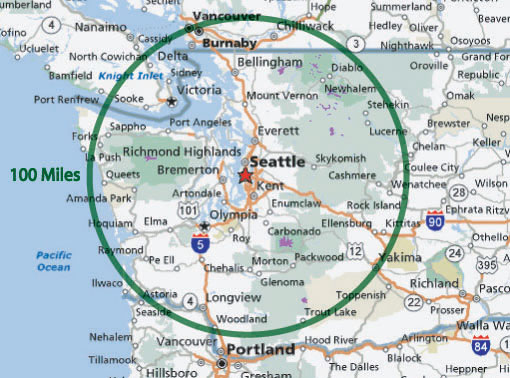
One hundred mile map for Seattle
The idea for STN was simple, and remains the germ of today's concept of Sail Transport Network as further developed in the culturechange website, principally by Dmitry Orlov, Paul Flowers and myself. Before summarizing it, here's the precursor of STN:
As a back-to-the-lander dabbling in farming (Pedal Power Produce Farm in Humboldt), who had not forgotten the freedom offered by sailing the open ocean, I thought of certain rivers, such as in Oregon. They would be good places, I reasoned, to base a farm whence one could canoe or raft down to the mouth of the river that had a marina. The best of both worlds, fresh water and land, and access to the sea, would be achieved. This concept did not enjoy a lot of support, but then again I was not thinking of a system for a community just yet.
So STN's basis was to be the linking of coastal, river communities and islands via renewable energy: wind in sails. Paddling canoes and kayaks is another form of renewable energy, and indeed these craft were, along with running, the whole transportation system of the Pacific Northwest native Americans from Alaska down south past Humboldt.
In the fall of 1999 one day I was at my Alliance for a Paving Moratorium office on the computer, and was spell-checking a document. My last name, Lundberg, was not known to the computer, and the suggested substitution was "landlubber." I was galvanized to soon prove the computer wrong!
A vestige of STN's vibrant ancestry was active until early in the 20th century in Puget Sound, especially Elliot Bay that laps up against Seattle: the Mosquito Fleet. Many of the vessels were ultimately motorized, but it was a successful, efficient mix of boats that served the Sound's growing population well. (The modern ferries have had hideous histories of polluting, which has been fought by San Francisco's Bluewater Network.)
This was before the dominance of cars, trucks and their highways and bridges. Before the Mosquito Fleet the indigenous tribes had plied the relatively calm, protected waters of the Sound and northward for millennia. There were no greenhouse gases or harm to other species, and no lack of boat building materials. The old growth cedar were most plentiful, and were made into long war-craft too.
STN is conceived in 2007 as a potential match-making service for linking captains with needed crew, and potential crew who need passage. Rather than building new boats or undertaking expensive refits, or purchasing expensive and large yachts, the efficient and quick approach is to utilize whatever functioning boats there are available.
As for cargo, it can be moved from Point A to Point B as crew "baggage" that can get around regulations and red tape legally.
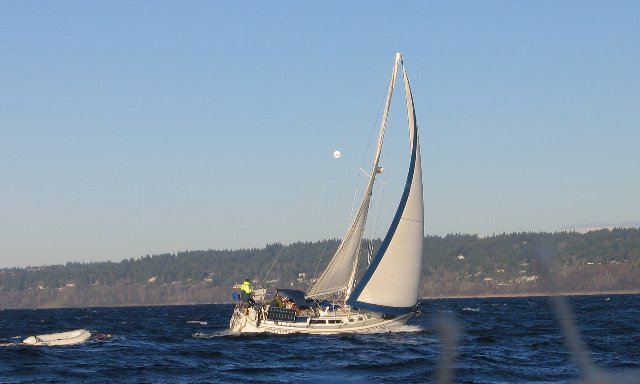
S/V Soliton, Fulvio Casali, crossing Puget Sound from Port Madison to Shilshole Bay. Photo by Dan Karten
If some coffee is brought to the U.S. from the south, or Hawaii, the label could say "Sail Transported" in addition to the "Fair-trade, shade-grown, organic" attributes that fetch a premium price.
Quantities will not be anything like today's fossil-fueled orgy of consumption, but will include many essential trade items including heirloom seeds and wisdom in the heads of the sailors to share with others across the sea.
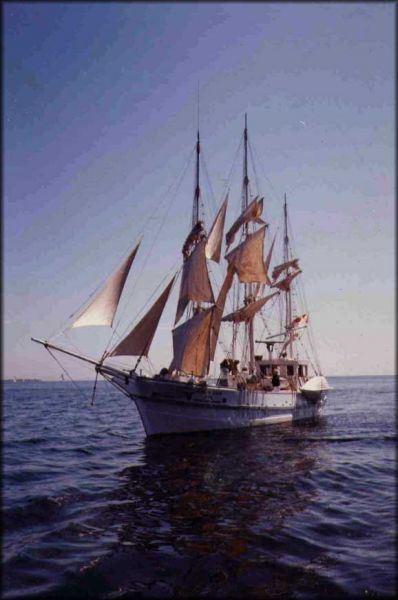
North Star, Port Townsend, courtesy Wooden Boat Foundation
Ecotopian daydream of sail-based community
Fulvio Casali, a sailor in the Puget Sound active with SCALLOPS and Sustainable Ballard, offers this Ecotopian day-dream that could very well spell our future -- if we are so lucky:
The doorbell rings. You open the door, and the delivery man hands you your weekly basket of produce from the CSA. With a smile, you inhale the mixed fragrances - you don't know which one is stronger - is it the thyme, the ripe peaches, the basil, or the bunch of cut flowers?
Suddenly you remember: the tip! You open the door and run outside again - good, he was just about to take off again on his freight bicycle. With a grateful smile, he tells you he was just about done with the CSA deliveries, but he has to make it back to the boat down at the dock. The skipper is waiting for his repaired mizzen sail, so the delivery guy needs to make another stop at the sail loft on Leary Way on the way back to the ketch.
The story had made the rounds last week: several boats got themselves into a bit of trouble in the last gale. Maybe the summer caused many sailors to throw caution to the wind (no pun intended), even though nobody was taking the old predictable weather patterns for granted anymore by now. Fortunately, there were no major losses, but the ketch which today had taken on the CSA cargo had suffered a torn sail.
The sail loft was one of many businesses that had sprung up or expanded since the mosquito fleet of cargo and passenger sailboats started blanketing the waters of Puget Sound with sails, not unlike the fields of windmills that had sprung up in the plains of Eastern Washington state, and on ridges everywhere. You remember your last trip to the Olympic Peninsula, to visit your friends who run the farm outside of Poulsbo: short hike down to the harbor, boarded the boat, enjoyed the crossing on a sunny morning with a perfect little breeze, and the horse-drawn wagon ride to the country from Liberty Bay, made more lively by the chatty local passengers.
It was interesting to watch the skipper of the boat conduct his business via radio and wireless internet connection with the dispatch center, while his crew tended to the sails: he verified the cargo manifests for his next few trips of the day as they downloaded to his computer. Some shipments were not time-sensitive, as they were stored at the warehouses in the harbors, but many were processed in real-time, so the senders had to be notified that a boat would be ready for pickup at a certain time, which could be predicted with good accuracy by tracking the wind conditions and the movements of all the boats and delivery bikes and carts via GPS.
It's all an intricate supply-chain where technologies developed for world-wide trade and shipping when oil was still plentiful and cheap, are applied on a much smaller scale with renewable energy used for transportation, and a whole new array of trades and businesses. Whatever fossil fuels are still left, are now being used much more selectively for crucial infrastructure, such as the communication networks, including the satellites.


Sail freight service between California and Mexico!
Downwind Marine in San Diego offers Baja Express, mail-collection and free forwarding that is clearly spelled out for folks availing themselves of this alternative to costly, polluting trucking.
DEFINITION OF MAIL:
any carton containing parts, paint,
other maintenance supplies,
anchor, chain, etc.
LETTER-TYPE MAIL: "Downwind
appreciates the importance of news
from home. However, we don’t have
the time or personnel to sort and
identify single pieces of mail that
are incorrectly or insufficiently
addressed (often requiring radio
inquiries) for the 800-plus vessels
cruising the Sea of Cortez and west
coast of Mexico with one or more
persons onboard. PLEASE have
your people back home put all your
mail in a manila envelope once a
month or so, label it with your BOAT
NAME and YOUR NAME, and we
will gladly forward it to you
expeditiously. Please try by some
method to keep us up to date on
where you want your mail sent.
BOAT PAPERS,
PASSPORTS & other IMPORTANT
DOCUMENTS will have PRIORITY
HANDLING via the BAJA
EXPRESS."
'BAJA EXPRESS': Any gear
purchased through DOWNWIND
MARINE takes top priority."
http://www.downwindmarine.com
http://www.downwindmarine.com/downloads/cruisingdownwind.pdf

Another arm or two from Paul Flowers
Editor's note: I know Paul to be a first rate singer, with Welsh passion and American soul-power, so his comments on arts and crafts are not to be taken as if he is a Philistine. - JL
Consider the following additional arms to your starfish, as it were.
First I'll put out what everybody hates to talk about the most, but is biggest make or break issue.
Security and Defense of the community: Whether it is peak oil, economic collaps or a nuclear sun rising in the middle of downtown USA, any mass survival situation is going to be fraught with lawlessness for at least a few years. There will be people with guns who don't care how much you want to save civilization and be peaceful and eco-friendly; they want your food and medicine and they want it now.
As a combat veteran, I have seen the effects of civil war. Trust me, security is an issue. The above paragraph isn't conjectural, I've seen it happen in three different countries. Guns exist and people have them and aren't afraid to use them and there's nothing that anyone can do about that. Believe me, unless you want some creep with a feudal-lord-and-vassal trip with a big ego to come along with a bunch of guns and lackeys who aren't afraid to shoot 'em, this community might want to have a few of their own as well -- unless no one really minds the idea of having all the community's supplies being looted, or becoming a serf.
Also, there must be decision making on a community and regional scale; in other words, a system of government. Be it participatorily democratic (as in consensus or direct democracy) or try and tweak the representative system to make a bit more fair. I don't know, but I do know that communities need to run; people need clarity. They need to understand that they are not completely on their own and that there is a body of their peers out there who are doing all the things that they don't know how to do. Make sure the water is potable, make sure the trash is taken care of, make sure food is fairly and evenly distributed in a timely fashion, make sure that the livestock farmers have everything they need, and form networks of acquisition when they don't.
On the food arm. You can't expect everyone to eat at the same table in post-America. Therefore food distribution needs to be organized. If you're talking food distribution, then you also have to talk about either a straight giveaway system (which you can't possibly expect even 5% of food producers to go along with...people have to grow the stuff which means a lot of hard, sweaty backbreaking work...try and get someone to just up and give their hard work away...) or you need to discuss some form of exchange. This is the basis of economy. Economy is not necessarily connotative to money. A barter economy is an economy too. But how to decide what is worth what? How much for what? These are all things that need to be taken into consideration even before arts and culture. If a community without a support system -- any town in America after the electricity stops working, which would also cause the pressurized urban water distribution system to fail as it is dependent on electricity for its operation -- has not considered ALL the basics of survival in a community setting, then all the arts and crafts are for naught because you wouldn't even survive to create another generation.
When tshtf, it's probably a good idea to figure out how to remake much of the underlying systems to society that we all take for granted that will suddenly be gone before worrying about arts and culture, and you should clarify homeless...what homeless? The existing homeless of today, or the 115 million homeless from whatever happens? If it's the latter...don't even bother. People will find their own spaces. Abandoned houses, camps, these kinds of things will become commonplace. I don't think that an open bay shelter for the homeless (such as what exists today) would be such a good idea. No matter what it is that happens, people will be traumatized. PTSD will be boiling in the heads of the people. They will need their own space.
Culture Change contributor Dan Bednarz commented on the above, and had this more optimistic view:
"Public safety will be an issue but it is certainly tied to notions of community and identity. Will we see roving bands of brigands like in the Middle Ages?
"I do not know how to speak authoritatively about this topic, but my hunch is that brigands, if they occur as a social phenomenon, will want to integrate into society. And if we are talking about the few who will declare 'It’s a Pirate's Life for Me!' I think they would be at a disadvantage. As you know, with less energy massive armies will not be feasible anyway."
* * * * *
Sustainable Ballard:
sustainableballard.org
See Culture Change's articles on STN:
sailtransportnetwork.org
SCALLOPS website under construction:
http://scallops.sustainableballard.org
Bluewater Network
bluewaternetwork.org
The Maltese Falcon, mega sail-ship featured in
Wired:
wired.com
* * * * *
The Climate Emergency Fast is Sept. 4. Have nothing but water for 24 hours, and spread the word. It's time to strike.
- U.S. Climate Emergency Council:
climateemergency.org
- Fasting for healing and inner peace:
culturechange.org
- Pledge for Climate Protection:
culturechange.org
- Global Warming Crisis Council listserve: email Wanda Ballantine, the "Raging Grannie," to sign up:
wsb70@comcast.net
SCALLOPS list of member community organizations:
Sustainable Anacortes
(Beat the Heat - climate action)
Sustainable Bainbridge
neva.welton@gmail.com
www.sustainablebainbridge.net
Sustainable Ballard
vic@sustainableballard.org
www.sustainableballard.org/wiki
Sustainable Bellingham
cyndy.sheldon@comcast.net
www.sustainablebellingham.org
Sustainable Bremerton
GBelding@rfmarch.com
www.sustainablebremerton.org
Sustainable Burien
Sustainable Capitol Hill
gabrielscheer@gmail.com
Sustainable Crown Hill
carolbarber@comcast.net
Sustainable Eastsound
sharmuse@greendept.com
Sustainable Edmonds
steve@stevebernheim.com
Sustainable Eglon
pearson-deller@centurytel.net
Green Everett
Marilyn@ZippysJava.com
greeneverett.wikispaces.com
Sustainable Fremont
Sustainable Greenlake
Sustainable Gig Harbor
Sustainable Kitsap
Sustainable Lake Forest Park
miriamdoyle@verizon.net
Sustainable Langley
Sustainable Magnolia
derek.eisel@comcast.net
blog.seattlecitizen.org
Sustainable Mercer Island
lucia@studioectypos.com
www.islandvision.org
Sustainable Mountlake Terrace
erictgrdn@yahoo.com
Sustainable Community Roundtable of S. Puget Sound
kraftkf@comcast.net
www.sustainablesouthsound.org
Sustainable Orcas Island
pheikkinen@orcaslibrary.org
www.relocalize.net/groups/orcas
Sustainable Phinney
cecile@simplicitycircles.com
www.phinneyecovillage.net
Sustainable Port Angeles
Sustainable Port Townsend Local 2020
frankinpt@yahoo.com
www.l2020.org
Sustainable Puget Ridge
Queen Anne Neighbors
For Responsible Growth
nanciek@windermere.com
www.qanrg.org
Shelton Relocalization
amscott@hctc.com
www.relocalize.net/groups/shelton
Sustainable St. James
derek.eisel@comcast.net
blog.seattlecitizen.org
Sustainable Tacoma
Sustainable Vashon
megabucks28@yahoo.com
www.sustainablevashon.org
Sustainable Wallingford
wnfp@bridgings.org
www.meaningfulmovies.org
Sustainable Shoreline
flyingbear@can.net
www.sustainableshoreline.org
Sustainable Snohomish
environment.meetup.com/279/
Sustainable West Seattle
bill@sustainablewestseattle.org
www.sustainablewestseattle.org
The Relocalization Network
http://www.relocalize.net
